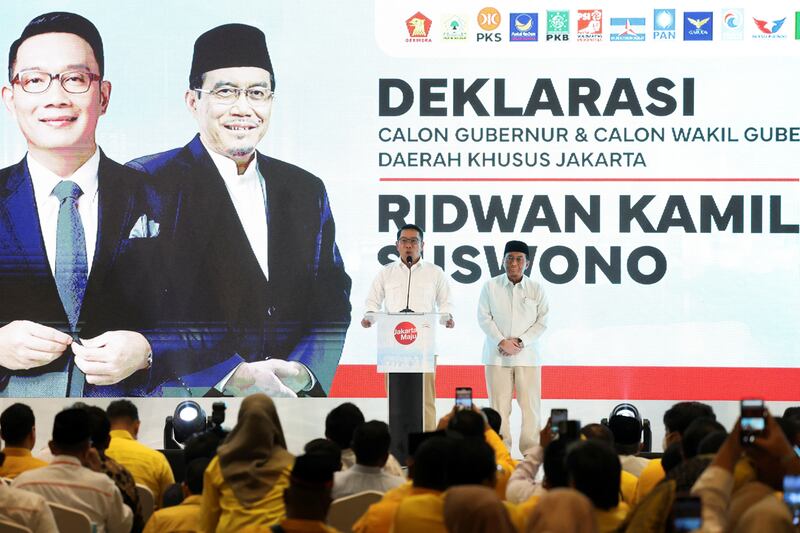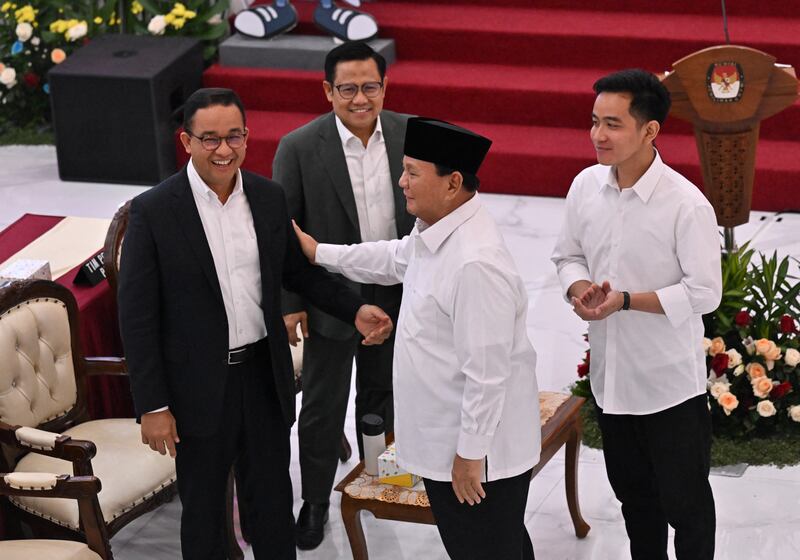Most parties on the Jakarta city council on Monday nominated Indonesian President-elect Prabowo Subianto’s choice as their candidate for the capital’s governor, all but scuttling the chances of rivals being able to run in the November contest.
While former Jakarta Gov. Anies Baswedan has been comfortably leading in recent opinion polls on the race, analysts said that the move has effectively prevented an opposition from running, thus undermining democracy.
Parties that had earlier backed Anies, all parties in Prabowo's coalition and the ones that officially aligned with the coalition after the presidential election, together nominated Ridwan Kamil, a former West Java governor, as their candidate for the Jakarta governor's race.
After he was nominated at an event on Monday, Ridwan outlined plans to deal with Jakarta’s challenges, such as flooding, unemployment, pollution and the lack of public spaces.
"Jakarta faces many global challenges. We must address the climate crisis, with rising sea levels and continued flooding,” he said. “We are preparing technical solutions.”
Ridwan, a member of the Golkar Party, which is a part of Prabowo’s coalition, has also been on the president-elect's campaign team.
Anies, who had been Jakarta governor from 2017 to 2022, had initially received support to run again from the three parties that had supported his failed presidential bid earlier this year – Prosperous Justice Party (PKS), National Awakening Party (PKB), and NasDem Party.
The three, though, switched to Ridwan – Suswono, a PKS politician and former minister, was named Ridwan’s running mate.
Of the parties supporting Ridwan, 10 hold a combined 85 of the 106 seats in the Jakarta city council. Two smaller parties, Gelora and Garuda, have no seats.
The sole party on the council that does not back Ridwan, the Indonesian Democratic Party of Struggle (PDI-P), with 15 seats, falls short of the 22-seat threshold required to nominate its own candidate.
Ridwan could face an independent ticket of Dharma Pongrekun and his running mate Kun Wardana, but the duo’s legitimacy is being questioned.
To run as an independent, a potential candidate must be supported by 600,000 Jakarta residents. But the Dharma-Kun ticket’s support is under scrutiny after accusations that the two fraudulently collected hundreds of thousands of Jakarta residents’ identity cards to back their candidacy.
This raises the possibility that Ridwan could run unopposed on Nov. 27, when local elections are held across the country for posts including governors, regents and mayors.

For Prabowo, an ally serving as Jakarta governor would be immensely useful, because the federal administration policies and the capital’s could function seamlessly, analysts said.
That would not be the case were Anies to be re-elected as Jakarta governor.
In March, Anies had challenged the result of the February election, which the Election Commission declared in Prabowo's favor.
Prabowo and his running mate, Gibran Rakabuming Raka, who is President Joko "Jokowi" Widodo's eldest son, swept the election, winning with 58.61% of the vote.
Anies received 24.9% and the third candidate, former Central Java Gov. Ganjar Pranowo, won 16.5%. They filed cases against the result separately in the Constitutional Court.
Two watchdog groups had labeled the election as the worst since Indonesia's transition to democracy 25 years ago, citing issues with campaign finance and electoral fraud.
Anies alleged that the inclusion of Jokowi’s son as a vice presidential contender influenced the fairness of the vote.
The ex-Jakarta governor’s campaign team had also alleged that the election was marred by fraud and favoritism toward Prabowo, whose campaign was bolstered by the implicit support of the immensely popular Jokowi.
A month later the court threw out both cases, saying there was “no legal basis” to the claim that the president or state agencies had interfered on behalf of Prabowo.
On Monday, Jokowi, who will soon complete the maximum two terms, reshuffled his cabinet to appoint allies of his successor to key ministries as Prabowo seeks to consolidate support before taking office in October.
The move involved replacing three ministers, appointing a new deputy minister, and ridding the cabinet of two PDI-P ministers.
The PDI-P had been Jokowi’s party and main backer until their relationship soured because of the president’s tacit endorsement of Prabowo instead of the party’s candidate in the Feb. 14 election.
‘Democracy requires opposition’
Analysts told BenarNews that Jakarta’s potential single-candidate race demonstrated how Indonesia’s political system inhibits the emergence of a viable opposition and limits the number of candidates who could compete in elections.
Since Indonesia’s transition to democracy, what has often happened after a general election is a quid pro quo arrangement, under which losing parties or coalitions ally with the winner in parliament so they can gain political appointments and other favors in exchange for supporting the ruling party’s interests in parliament.
Sometimes, although not always, these alliances may extend to regional elections.
Yon Machmudi, a political analyst from the University of Indonesia, said that PKS, for instance, moved its support to Ridwan from Anies, because it wanted to nominate its own member for Jakarta governor. It has the most seats on the city council.
“Despite PKS’s good standing with Anies, his failure to firmly announce a deputy governor from PKS caused uncertainty,” Machmudi told BenarNews, adding that the party chose a more realistic path than relying on Anies, who is not a party member.

Already, Prabowo's coalition on Thursday secured a parliamentary majority after the NasDem Party officially aligned with it, giving the coalition control of 52% of the parliament.
If PKB and PKS also ally with Prabowo’s coalition as many expect, there would only be one party, PDI-P, left in the opposition.
This is how parties end up acting at the behest of the political and economic “oligarchs,” said Ma’mun Murod, a political science professor at Muhammadiyah University in Jakarta.
“A healthy democracy requires opposition. Without it, we can’t call it democracy,” Ma’mun told BenarNews.
He expects that the way the Jakarta race looks likely to play out will replicate in gubernatorial elections in Central Java, West Java and Banten provinces, where Prabowo’s Gerindra Party and its coalition allies are poised to challenge the PDI-P.
'Win with their eyes closed'
Voter turnout could drop significantly in Jakarta because the race would not be competitive if only Ridwan and an independent contested the race, predicted Arya Fernandes, head of politics at the Centre for Strategic and International Studies (CSIS).
“This is not good for democracy. Jakarta’s elections are known for being highly competitive. It’s hard to imagine them being dull. Voter turnout could drop significantly,” Arya told BenarNews.
Wasisto Raharjo Jati, a political analyst at Indonesia’s National Research and Innovation Agency (BRIN), believes Ridwan has significant advantages over the independent candidate.
“Ridwan has a high chance of winning. The coalition’s logistical power is enormous,” Wasisto told BenarNews.
A researcher at the Jakarta-based Centre for Strategic and International Studies, Dominique Nicky Fahrizal, believes the current independent contestant may be a “puppet candidate” arranged to present the illusion of an uncontested race.
“[Ridwan and Suswono] can practically win with their eyes closed,” he said.
Tria Dianti in Jakarta contributed to this report.
